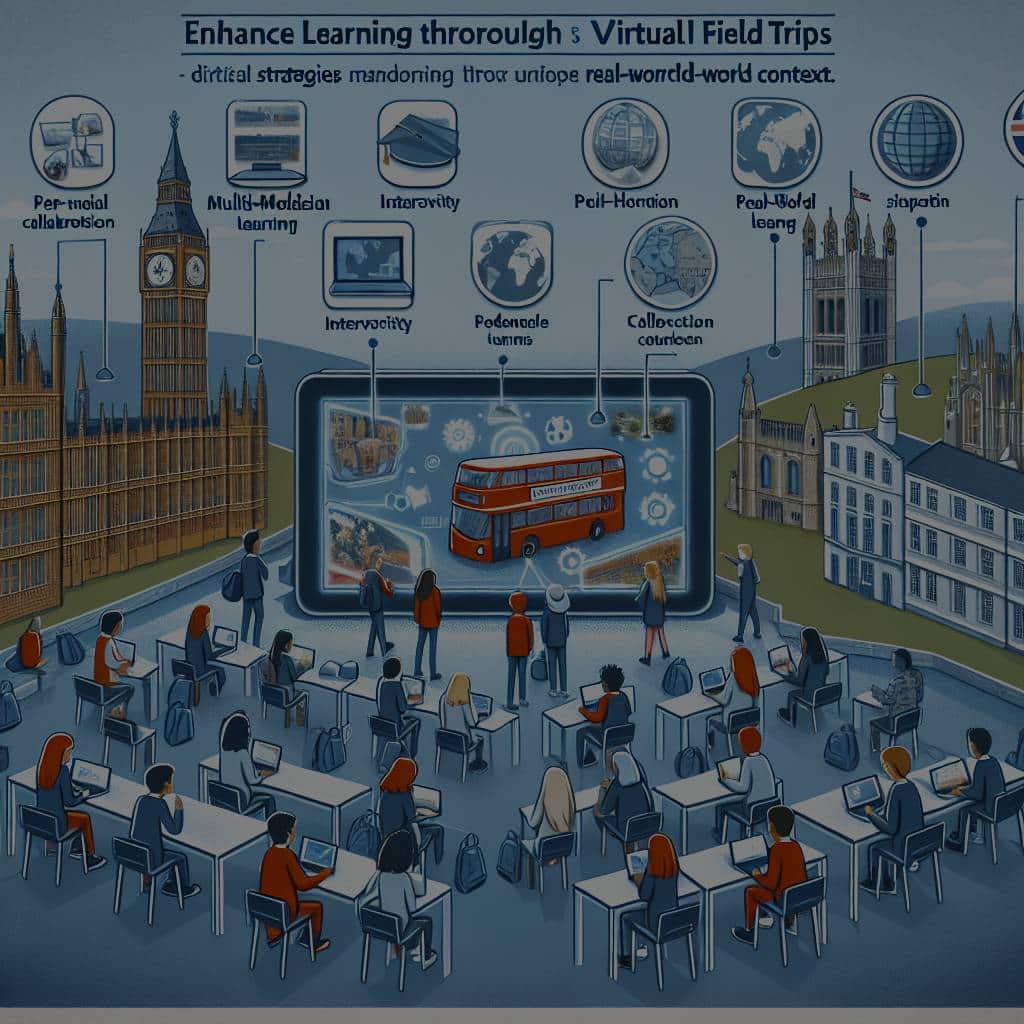What Strategies Enhance Learning through Virtual Field Trips for UK Students?

In today’s digital age, the way students access education and information has significantly evolved. Traditional classroom settings are being replaced or complemented by more innovative and technologically advanced methods. One such method that has seen considerable growth and interest is the use of virtual field trips in the learning process.
Virtual field trips, with their immersive video experiences and real-time interaction capabilities, offer students a unique opportunity to explore different environments, cultures, and concepts from the comfort of their classroom or home. When utilised effectively, they can significantly enhance the learning experience and outcomes. This article will explore the various strategies that can be employed to maximise the learning potential of virtual field trips for students in the UK.
Sujet a lire : What’s New in the Development of Organic Photovoltaic Cells?
Maximising the Learning Experience During the Trip
When you begin planning a virtual field trip for your students, it’s important to consider the various ways you can enhance their learning experience during the trip. The level of student engagement and interest can significantly influence the educational outcomes of a virtual field trip.
To ensure that your students are fully engaged, consider incorporating interactive elements into the trip. This can be through quizzes, puzzles, or tasks that students need to complete during the trip. The use of interactive elements can help increase student participation and involvement, making the learning experience more memorable and worthwhile.
Sujet a lire : How to Protect Your Digital Identity in an Increasingly Connected World?
Another strategy to enhance learning during the trip is to incorporate real-time discussions. These discussions can be facilitated through group chats or discussion boards, where students can share their observations, thoughts, and questions. This not only promotes active learning but also allows for immediate feedback and clarification, enhancing the overall education experience.
Preparing Students for the Trip
Preparation is a crucial aspect of any field trip, virtual or otherwise. One of the most effective ways to prepare students for a virtual field trip is by setting clear learning objectives. These objectives should be discussed with the students before the trip, giving them a clear understanding of what they are expected to learn and achieve from the experience.
Another effective way to prepare students is by providing them with background information about the destination or topic of the trip. This could be through pre-trip lessons, reading materials, or videos. This pre-trip preparation not only helps to pique the students’ interest but also allows them to have a better understanding and appreciation of the virtual field trip.
Integrating the Trip into the Curriculum
Virtual field trips should not be standalone events but should be integrated into the overall curriculum. This will help ensure that the lessons learned during the trip are relevant and reinforce the concepts taught in the classroom.
Integration can be achieved by aligning the trip with the topics currently being covered in the lesson. This would provide a practical, real-world context to the theoretical knowledge taught in the classroom, making it easier for students to grasp.
Post-trip assignments or projects can also be effective in integrating the trip with the curriculum. These assignments could require students to reflect on their experience, apply their learning in a practical context, or further research the topics covered during the trip. This not only allows for reinforcement of the lessons learned but also promotes critical thinking and independent learning.
Selecting Appropriate Virtual Field Trips
Choosing the right virtual field trip is essential to ensure that it aligns with the students’ learning objectives and curriculum. When selecting a trip, consider the educational content, the level of interactivity and the suitability for the age and maturity level of the students.
Look for trips that provide a rich, immersive experience, with high-quality videos and visuals. The trip should provide a good balance of educational content and entertainment to keep the students engaged and interested.
Utilising Technology to Enhance Virtual Field Trips
Finally, the role of technology in enhancing the virtual field trip experience cannot be understated. The right technology can make the trip more engaging, interactive, and immersive.
Consider using virtual reality (VR) technology for your virtual field trips. VR provides a highly immersive experience, allowing students to feel as though they are actually at the field trip location. This can significantly increase students’ interest and engagement, leading to better learning outcomes.
To facilitate real-time discussions and interactions, consider using a platform that allows for group chats or video conferencing. This would allow students to share their thoughts, observations, and questions during the trip, enhancing their learning experience.
In conclusion, virtual field trips offer a unique and innovative method for enhancing students’ learning experience. With careful planning, the right strategies, and effective use of technology, they can significantly enrich the educational journey of students in the UK.
Evaluating the Impact of Virtual Field Trips on Student Learning
Evaluating the impact of virtual field trips on student learning is a vital aspect of this learning strategy. Feedback tools such as surveys, quizzes, and discussions can be very effective in gauging students’ understanding and interest in the subject matter covered during the trip.
For instance, teachers could create a pre-trip and post-trip survey to measure the change in students’ knowledge and comprehension of the topic. A significant improvement in the post-trip survey results would indicate that the virtual field trip was a successful instructional strategy.
Furthermore, teachers can encourage students to provide feedback about their experience during the trip. This feedback could cover areas like the level of engagement, the clarity of the content, the effectiveness of the interactive elements, and their overall satisfaction with the trip. This kind of feedback can provide valuable insights into how virtual field trips can be improved and tailored to meet the needs and learning styles of different students.
In addition, incorporating a meta-analysis of the students’ performance on assignments and quizzes related to the virtual field trip can also be insightful. By comparing this data with the performance on other topics, educators can assess the effectiveness of virtual field trips in enhancing comprehension and retention of the subject matter.
Incorporating Digital Citizenship and Sustainability Issues
Virtual field trips offer an excellent platform to teach students about digital citizenship and important global issues like climate change. Given their immersive nature, students can explore different scenarios and consequences of actions in a controlled, virtual environment. This can help them understand the long-term effects of their decisions and actions, fostering a sense of responsibility and accountability.
For example, a virtual field trip to a simulated future world dealing with the impacts of climate change can provide students with a vivid, first-hand experience of the potential consequences of current decisions and habits. This could be a powerful tool to foster awareness and motivation to act towards a more sustainable future.
Moreover, digital citizenship – the responsible and appropriate use of technology – is another crucial lesson that can be incorporated into virtual field trips. Students can learn about online etiquette, privacy, and security through their interactions in the virtual environment.
Given the increasing prevalence of technology in everyday life, teaching students about digital citizenship can equip them with the necessary skills to navigate the digital world responsibly and safely.
Conclusion
In conclusion, virtual field trips represent a significant shift in the traditional learning environment. They offer a highly immersive and engaging method of instruction that can significantly enhance student learning.
The key to maximising the potential of virtual field trips lies in careful planning, selecting appropriate trips, integrating them within the curriculum, using the right technology, and evaluating their impact. Furthermore, virtual field trips also provide a unique opportunity to teach students about critical issues like digital citizenship and climate change.
As technology continues to evolve and become even more integrated into our lives, it is crucial for educators to adapt and leverage these new tools to create a more engaging, interactive, and effective learning experience. Virtual field trips, when utilised effectively, can be a powerful tool in this regard, helping to shape the future of education in the UK and around the world.
